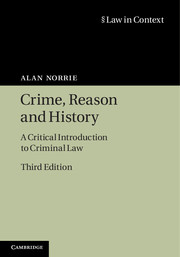Book contents
- Frontmatter
- Dedication
- Contents
- Preface to the third edition
- Preface to the second edition
- Preface to the first edition
- Table of cases
- Table of statutes
- Prologue: A brief history of the ancient juridical city of Fictionopolis
- Part I Context
- 1 Contradiction, critique and criminal law
- 2 The historical context of criminal doctrine
- Part II Mens rea
- Part III Actus reus
- Part IV Defences
- Part V Concluding
- Bibliography
- Index
1 - Contradiction, critique and criminal law
Published online by Cambridge University Press: 05 October 2014
- Frontmatter
- Dedication
- Contents
- Preface to the third edition
- Preface to the second edition
- Preface to the first edition
- Table of cases
- Table of statutes
- Prologue: A brief history of the ancient juridical city of Fictionopolis
- Part I Context
- 1 Contradiction, critique and criminal law
- 2 The historical context of criminal doctrine
- Part II Mens rea
- Part III Actus reus
- Part IV Defences
- Part V Concluding
- Bibliography
- Index
Summary
By and large, the dominant tradition in Anglo-American legal scholarship today is unhistorical. It attempts to find universal rationalising principles … The underlying structure of the law class remains that of forcing the student to reconcile contradictions that cannot be reconciled. If you do it very well, you then become a professor and you demand it of your students and you continue to do it in your legal scholarship. The ideological ‘tilt’ of current legal scholarship derives from this attempt to suppress the real contradictions in the world, to make the existing world seem to be necessary … to be part of the nature of things. It is history that comes to challenge this approach by showing that the rationalising principles of the mainstream scholars are historically contingent. Consequently, analytic scholarship is anti-historical: it regards history as subversive because it exposes the rationalising enterprise.
(Horwitz, 1981, 1057)Introduction
The quotation from Morton Horwitz with which I begin this introductory chapter contains two main arguments which are central to the analysis of criminal law attempted here. First, there is the identification of traditional legal scholarship as entailing a ‘rationalising enterprise’. The standard textbooks affirm the possibility of a rational (logical) approach to criminal law based upon the identification, elucidation and application of certain general principles to the existing law. Williams, for example, prefaces the first edition of his Textbook on Criminal Law with the statement that he has sought to show ‘that the law is mainly rational’, joining in criticism so that it may be improved through ‘the effort to expose its shortcomings’ (Williams, 1978, v). Smith and Hogan heap praise on one case as ‘a major step towards a rational and principled criminal law’ while criticising other cases for ‘the mischief wrought by those extraordinary decisions’ (Smith and Hogan, 1983, v). What makes those decisions ‘extraordinary’ is that they are irrational and unprincipled. The orthodox approach to criminal law scholarship is committed to what MacCormick (1993) has termed ‘rational reconstruction’, the ‘production of clear and systematic statements of legal doctrine, accounting for statute law and case law in terms of organising principles’.
- Type
- Chapter
- Information
- Crime, Reason and HistoryA Critical Introduction to Criminal Law, pp. 9 - 18Publisher: Cambridge University PressPrint publication year: 2014



